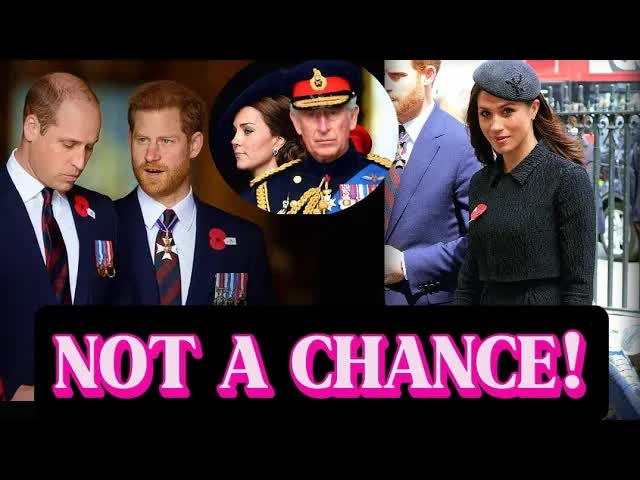The House of Windsor is currently experiencing a tumultuous chapter, one that is shaking the very foundations of its long-standing traditions.
Once viewed with unwavering admiration, members of the royal family are now facing a shift in public sentiment that has left many questioning their relevance and appeal.
While King Charles and Prince William grapple with dwindling popularity, the Duke and Duchess of Sussex, Harry and Meghan, seem to be enjoying a resurgence in public favor.
This unexpected turn has sparked conversations about karma and whether the actions of these royal figures are coming back to haunt them.
To truly understand the evolving opinions surrounding the monarchy, it’s essential to examine the recent developments that have influenced these narratives.
The British monarchy finds itself at a pivotal moment, where the decisions made by its members could have significant implications for both their personal futures and the institution’s longevity.
King Charles’s rise to the throne was anticipated as a smooth transition, a chance for national celebration and unity.
However, instead of reinforcing the monarchy’s role as a stabilizing force, his coronation has been overshadowed by controversy and public skepticism.
The initial excitement surrounding the coronation has faded, replaced by a growing unease among the British populace.
Debates about the monarchy’s relevance in today’s society have dominated headlines, revealing a deeply divided public opinion.
While some citizens stand firmly behind King Charles, others express disappointment and frustration regarding his approach to various issues.
Interviews with the public illustrate a spectrum of perspectives, from those advocating for patience as he finds his footing to those who question his suitability as a modern leader.
The shadow of Princess Diana looms large over King Charles’s reign.
Many still associate him with her suffering, and this unresolved past complicates his efforts to cultivate a positive image.
His perceived emotional detachment, a trait that has followed him for years, is now under intense scrutiny.
Commentators often contrast his reserved demeanor with the warmth of his mother, Queen Elizabeth II, which has made it difficult for him to forge a personal connection with the public—a vital aspect of contemporary leadership.
Public appearances by Charles have drawn mixed reactions, with some crowds offering polite applause while others express their discontent vocally.
These events, aimed at enhancing his image and showcasing his commitment to public service, often highlight the prevailing division in public sentiment.
Protests, though not massive, have become increasingly common during royal engagements, signaling a growing sentiment that questions the monarchy’s place in modern life.
Such demonstrations reflect the uphill battle Charles faces in maintaining respect for the institution he represents.
Despite his intentions to modernize the monarchy, Charles’s efforts have been met with skepticism.
Initiatives designed to make the royal family more relatable and aligned with contemporary values are often dismissed as superficial.
Critics argue that true modernization requires deeper reforms, and many view his environmental activism as disconnected from the realities faced by everyday citizens.
This disconnect underscores a broader challenge for Charles as he attempts to bridge the gap between his privileged existence and the concerns of the general public.
Caught between tradition and the need for change, King Charles’s ability to connect with an increasingly disillusioned public is crucial for the future of the monarchy.
As he navigates these turbulent waters, the question remains: can he adapt and lead the institution into a new era, or will he be remembered merely as a transitional figure?
The challenges ahead are undeniably daunting.
Prince William, once hailed as the golden boy of the royal family, has also seen his public image shift significantly over the years.
Initially celebrated for his charm and sense of duty, he now faces a growing wave of criticism.
While he retains popularity among certain circles, the tide of public perception has gradually turned against him, reflecting the complexities of modern royal life.
In stark contrast, Harry and Meghan have experienced a notable resurgence in popularity, particularly on the global stage.
Their decision to break free from royal constraints seems to have resonated well, allowing them to adopt a more relatable and modern public persona.
Their recent tours and engagements have been met with enthusiasm, suggesting that their new approach may have been a savvy choice.
Their recent visit to Colombia exemplified this newfound popularity.
The couple engaged warmly with locals, participated in cultural activities, and showed genuine interest in the country’s vibrant heritage.
Their visit was not just a royal obligation; it was a heartfelt engagement that left a lasting impression on both the Colombian people and the international community.
Their ability to connect with individuals from all walks of life has made them relatable figures, breaking down barriers that often exist between public figures and the general populace.
As Harry and Meghan depart from Colombia, they leave behind a legacy of goodwill and inspiration.
Their journey was more than a royal tour; it was a celebration of connection, compassion, and the potential for positive change in the world.
In a time of uncertainty for the British monarchy, their approach may serve as a powerful reminder of the importance of authenticity and empathy in leadership.
